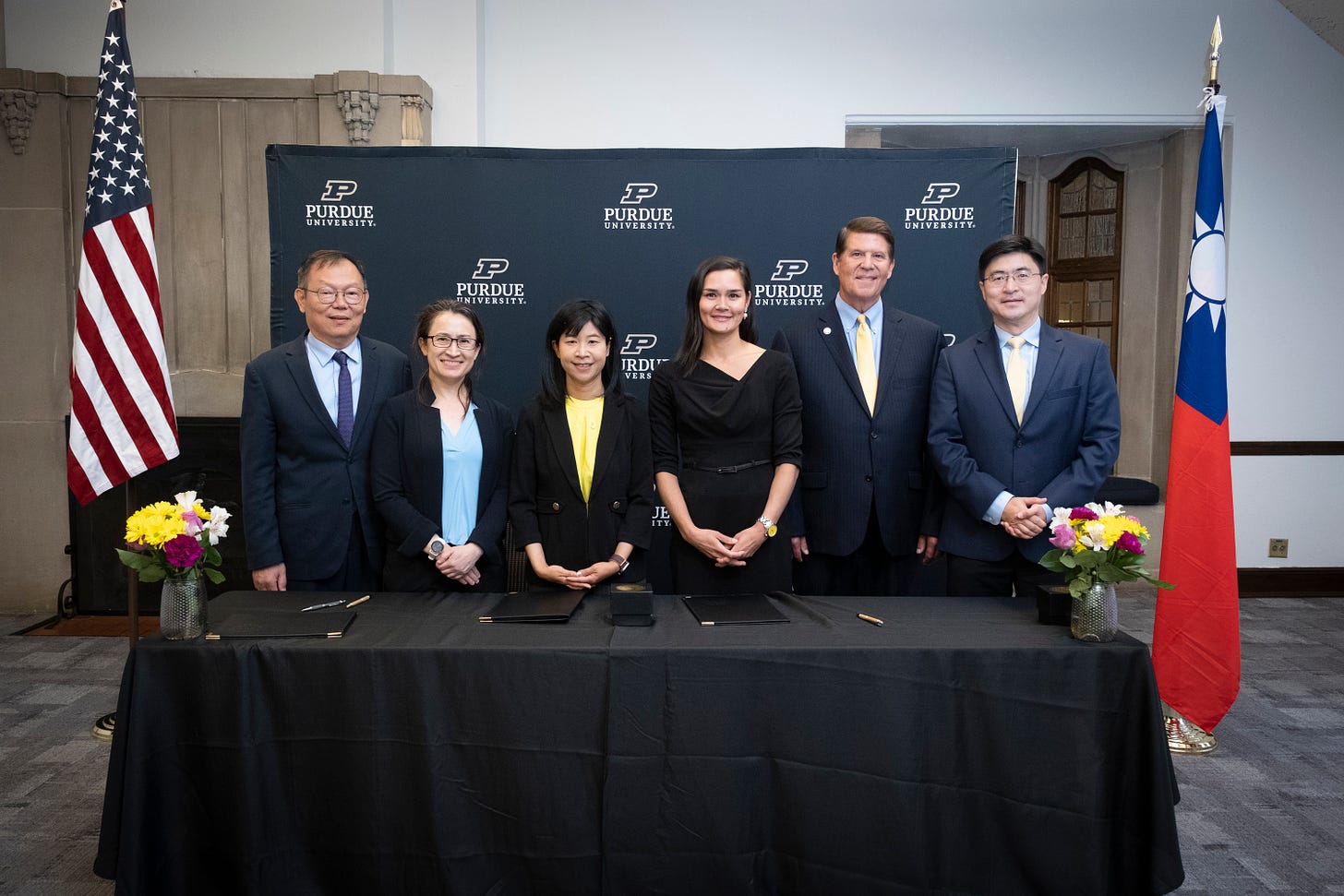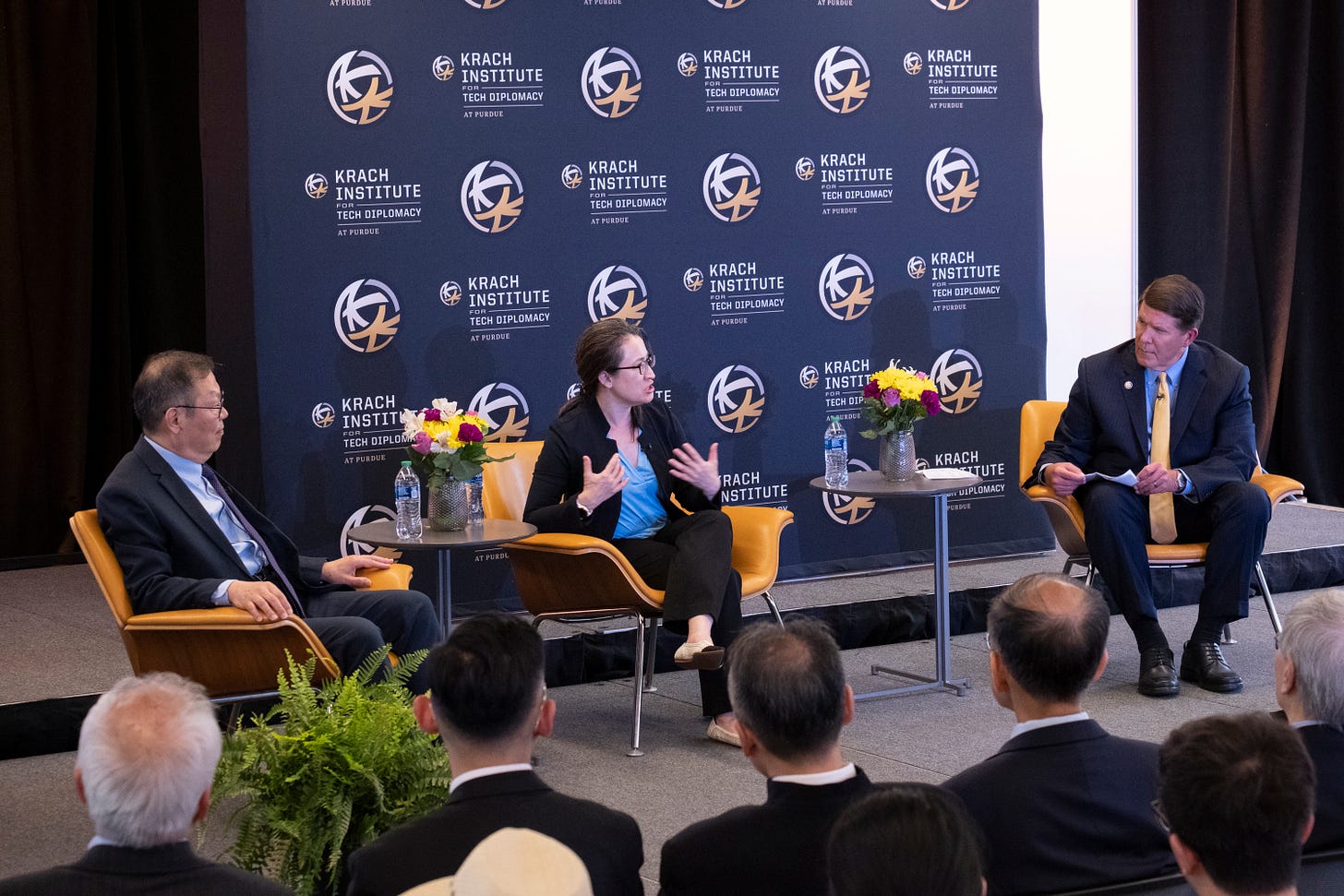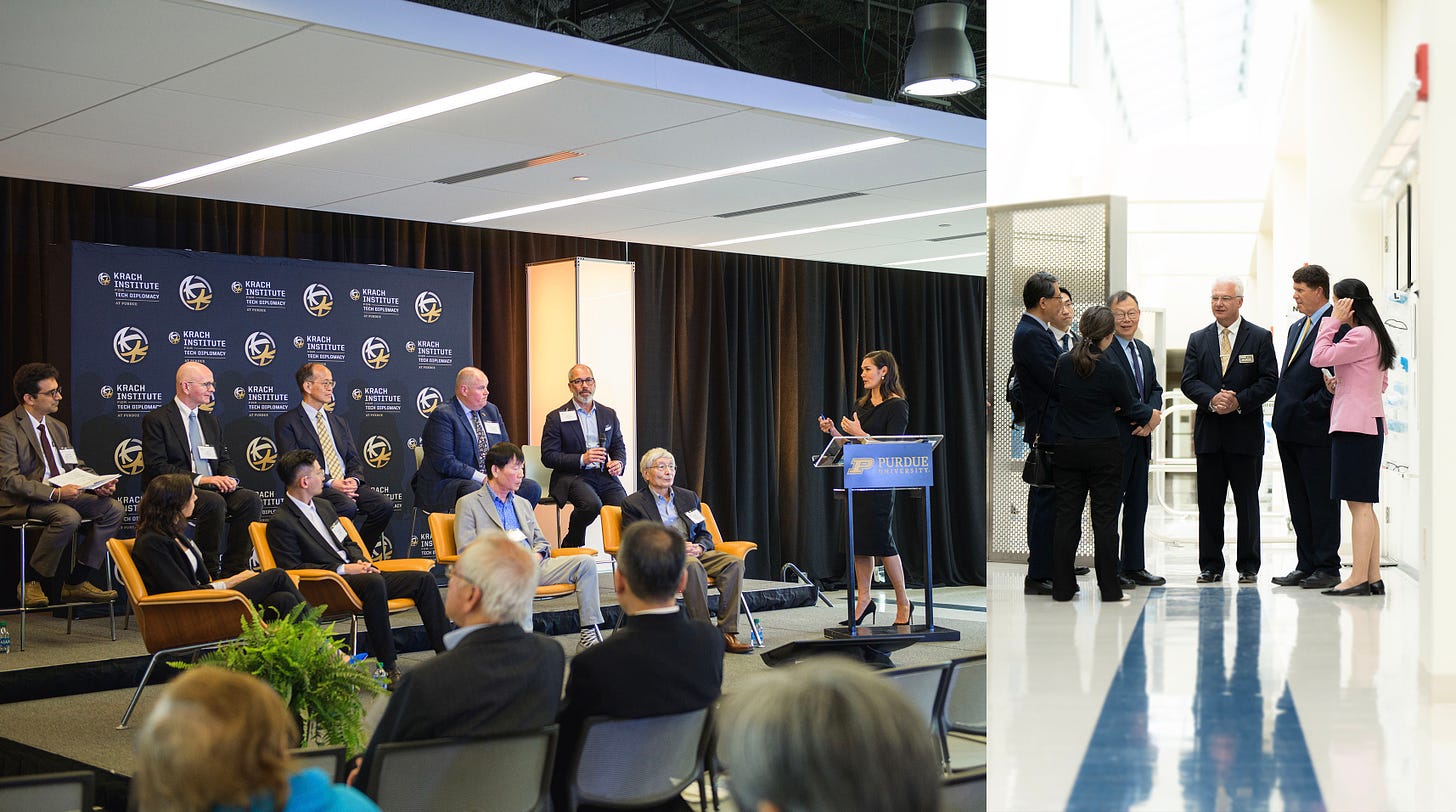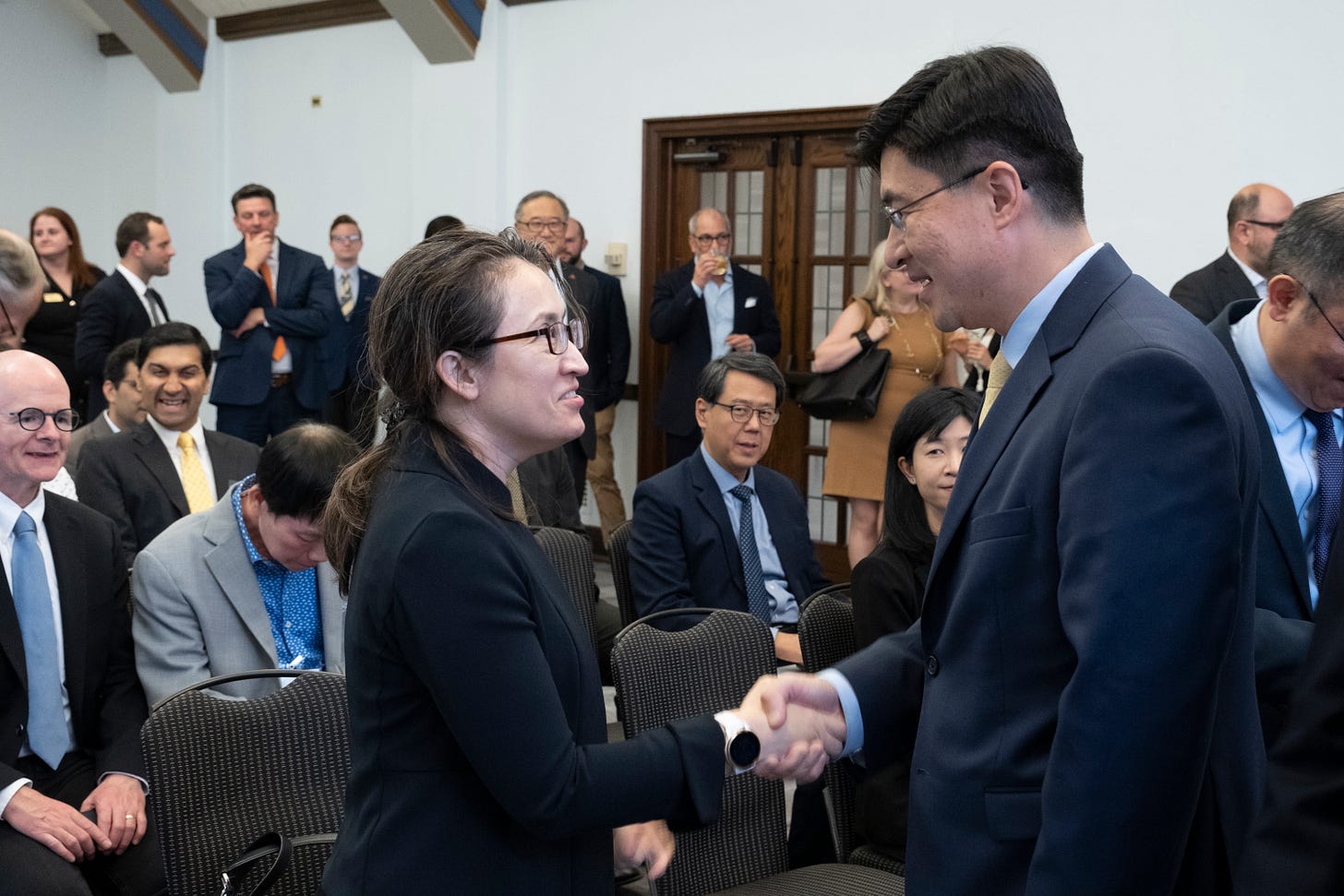Tech Diplomacy Now: Are Digital Currencies Dead?
China launched its digital currency, the e-CNY or the digital yuan, during the 2022 Beijing Winter Olympics and has continued to incorporate its use across the Chinese domestic economy aggressively.
TABLE OF CONTENTS
Top News of the Week
Announcements
Technology Strategy and Policy
Artificial Intelligence
Telecommunications Networks and Infrastructure
Critical Minerals
Synthetic Biology
Quantum
Advanced Aerospace Technology
Semiconductors and Microelectronics
Energy and Climate
Opinion and Commentary
The Last Word
Top News of the Week – Are digital currencies dead?
After watching the spectacular implosion of FTX and the troubles hounding other leaders in the crypto-currency field, one might believe that initiatives to launch digital currencies had ended.
Not so for Central Bank Digital Currencies (CBDCs)…
Several countries have either rolled out their own, have set goals to launch them, or are exploring the options of issuing this new type of money.
Unlike cryptocurrencies, CBDCs are issued by a country’s central bank and backed by the government as legal tender, just as they do with physical currency. Unlike our experience with cryptocurrencies or crypto-assets, the value of a CBDC would have the same kind of stability as a banknote.
China launched its digital currency, the e-CNY or the digital yuan, during the 2022 Beijing Winter Olympics and has continued to incorporate its use across the Chinese domestic economy aggressively. Unlike a paper banknote, the People’s Bank of China (PBOC) can “see” all transactions and instantly confiscate these digital assets should they desire, making it an ideal method of surveillance and social control.
So far, the PRC has limited the e-CNY to domestic transactions, but some fear that Beijing plans to use their CBDC to challenge and disrupt the U.S. dollar and make themselves and others “sanctions-proof.”
In the United States, the U.S. Treasury and Federal Reserve have begun studies on the feasibility of the United States issuing its own CBDC. But significant political resistance has formed against a digital dollar on both the left and right of the political spectrum. We should not expect to see much movement from Washington.
In Europe and Asia, the European Central Bank, the Bank of England, and the Bank of Japan are studying the feasibility of a digital euro, a digital pound, and a digital yen. Australia and India have begun to launch theirs. The idea is to make sure citizens have currencies that can adapt to an economic life that has become almost exclusively digital in just the last few years. Additionally, countries in Europe and Asia are concerned that failure to pursue their own digital currencies allows Beijing to set the norms and standards for what will likely become the future of money.More on the diplomacy to establish AI guardrails:
The digital dollar’s bipartisan problem – Politico, June 12, 2023
China is Doubling Down on its Digital Currency – FPRI, June 2, 2023
Which countries have made the most progress on CBDCs so far in 2023 – Atlantic Council, March 21, 2023
Executive Order on Ensuring Responsible Development of Digital Assets – Executive Office of the President, March 9, 2023
Japan’s central bank to pilot digital currency starting in April – TechCrunch, February 20, 2023
Digital Currencies: The US, China, and the World at a Crossroads – Hoover Institution, March 4, 2022
Announcements
The Krach Institute for Tech Diplomacy at Purdue recently welcomed Ambassador Bi-khim Hsiao, Taiwan's Representative to the U.S., initiating a groundbreaking advancement in strategic technological collaboration to promote freedom and trust globally.
The visit, a landmark in the Institute's international engagement, underscored the shared democratic values of Taiwan and the United States. Two Memorandums of Understanding (MOUs) were signed, facilitating extensive collaboration between Purdue University and Taiwan’s National Yang Ming Chiao Tung University (NYCU) and National Chengchi University (NCCU), specifically in the vital field of semiconductors.
Chairman of the Institute, Keith Krach, hosted a discussion with Ambassador Hsiao and NYCU President Dr. Lin, emphasizing the potential of technological collaboration to accelerate innovation and ensure the adoption of trusted technology.
The Institute’s CEO, Michelle Giuda, conducted an industry forum, underlining the necessity for public-private partnerships to develop technology responsibly. The delegation also had an exclusive tour of Purdue’s state-of-the-art Birck Nanotechnology Center and the Neil Armstrong Hall of Engineering.
“These agreements will considerably enhance the U.S.-Taiwan ties, catalyzing technological innovation and strengthening Taiwan's sovereignty and international standing,” said Keith Krach. "Our expanding partnership will turbocharge trusted technology and bolster freedom for us all."
Ambassador Hsiao commended the shared democratic values that form the bedrock of Taiwan-U.S. relations and echoed her confidence in the upcoming collaboration with the Krach Institute, stating, “We share a common goal of technological advancement that benefits humanity and is not weaponized by authoritarian regimes against us. I am grateful to President Mung Chiang and Chairman Keith Krach for hosting me and the Taiwanese delegation at the Krach Institute for Tech Diplomacy at Purdue.”
Highlighting the responsibility of tech innovators, Dr. Lin stressed, “Technological innovation holds great promise, but it also increases threats to our way of life from authoritarian regimes. High tech must be trusted to serve humanity and not abuse universal human rights. NYCU and the Krach Institute see the challenge the same way. We both understand the importance of trusted technology. We both seek to nurture talents as assets to society for they are the masters of the future. And we both put our philosophy in action to build a better and safer world.”
“Securing freedom requires that we bring together – in new ways – high-tech private-sector know-how, technology expertise, such as the leading STEM students and researchers at Purdue or NYCU and NCCU, and foreign policy and national security expertise,” said Michelle Giuda. “That integrated expertise and partnership – among public and private, partners and allies – is required to secure freedom and secure high tech, and why we are so excited to strengthen our partnership with Taiwan.”
Technology Strategy and Policy
Europeans Take a Major Step Toward Regulating A.I. – NYTs, June 14, 2023
Xi Tells Gates China Is Willing to Engage in Tech Cooperation – Bloomberg, June 15, 2023
U.S. Grapples with Potential Threats from Chinese AI – WSJ, June 16, 2023
Why It Seems Everything We Knew About the Global Economy Is No Longer True – NYTs, June 18, 2023
Artificial Intelligence
When Doctors Use a Chatbot to Improve Their Bedside Manner – NYTs, June 12, 2023
Europe moves ahead on AI regulation, challenging tech giants’ power – WaPo, June 14, 2023
How Generative AI Can Augment Human Creativity – Harvard Business Review, June 2023
Southeast Asia to set 'guardrails' on AI with new governance code – Reuters, June 16, 2023
China's ByteDance Has Gobbled Up $1 Billion of Nvidia GPUs for AI This Year – Tom’s Hardware, June 16, 2023
Telecommunications Networks and Infrastructure
How the US is pushing China out of the internet’s plumbing – Financial Times, June 13, 2023
When a Huawei Bid Turned into a Hunt for a Corporate Mole – Bloomberg, June 15, 2023
EU tells its members to ban Huawei and ZTE over ‘materially higher risks’ than other 5G suppliers – SCMP, June 16, 2023
Huawei wins lion’s share of China Mobile’s 5G base station contracts – SCMP, June 13, 2023
Indonesia, SpaceX launch satellite to boost internet connectivity – Reuters, June 19, 2023
Critical Minerals
Bauxite: Jamaica’s Lucrative “Red Dirt” – Geopolitical Monitor, June 16, 2023
Australia digs deep to break China’s dominance in critical minerals – WA Today, June 20, 2023
Australia taps global partners in landmark critical minerals strategy – Reuters, June 19, 2023
Australia, one of the world's biggest suppliers of raw minerals, unfurled a landmark strategy on Tuesday that outlines how it will work with investors and international partners to build a critical minerals processing industry for the energy transition.
US-led minerals partnership shortlists projects for green energy shift – Financial Times, June 14, 2023
A US-led group of 12 countries, plus the EU, plans to select large critical-minerals projects to develop by year end, in an attempt to lessen China’s dominant role in producing raw materials needed for green technologies.
The Mineral Security Partnership, convened by the US last June, has produced a shortlist of some 15 projects culled from about 200 options, said Jose Fernandez, US under-secretary for economic growth, energy and the environment, after visiting Sweden, Norway, Finland, France and the UK.
Synthetic Biology
Scientists talk sustainability at inaugural synthetic biology symposium – Stanford University, June 6, 2023
The Startup Bringing Home The $400B Bacon…Minus the Pig – Forbes, June 9, 2023
Next gen ‘precision biotics’ will deliver ‘measurable effects that consumers can feel’ – AFN, June 12, 2023
The idea of “holobionts” represents a paradigm shift in biology – The Economist, June 14, 2023
Introduction to Engineering Biology: A Conceptual Framework for Teaching Synthetic Biology – EBRC, June 16, 2023
Quantum
Quantum Computing Advance Begins New Era, IBM Says – NYTs, June 14, 2023
Intel Enters the Quantum Computing Horse Race With 12-Qubit Chip – CNET, June 15, 2023
China's quantum leap — Made in Germany – DW, June 13, 2023
Germany's oldest university hosts many scientists conducting groundbreaking work. Little did they know how they would become entangled in China's quantum military strategy.
Advanced Aerospace Technology
Scientists beam solar power to Earth from space for first time ever – Military and Aerospace Electronics, June 14, 2023
The Overlapping Galaxies of Delian Asparouhov – The Information, June 9, 2023
Semiconductors and Microelectronics
Intel Plans $4.6 Billion Polish Fab as EU Hub Picks Up Pace – Bloomberg, June 16, 2023
How a Chip Guru Left South Korea and Wound Up Accused of Leaking Tech to China – WSJ, June 15, 2023
Top US Chip Gearmaker Accuses China Rival of 14-Month Spy Spree – Bloomberg, June 15, 2023
Micron nears $1 billion investment in India chip packaging plant, Bloomberg reports – Reuters, June 16, 2023
Energy and Climate
The future of greenhouse gases – Stanford University, June 2, 2023
Purdue Extension to connect underserved communities with funding for energy and environmental improvements – Purdue University, June 5, 2023
Smart meters deliver new grid-edge intelligence for APAC and EMEA – Smart Energy International, June 19, 2023
Opinion and Commentary
How to leverage America’s software advantage in the decisive decade – Wendy Anderson and Michele Flournoy, Breaking Defense, June 13, 2023
America Still Leads the World, But Its Allies Are Uneasy – Niall Ferguson, Bloomberg, June 18, 2023
The Last Word
“Many of us believe that we are in an enormous technology competition, particularly with China, and that national security means winning the battle around AI.”
Senator Mark Warner (D-VA), Chair of the Senate Select Committee on Intelligence
About: Tech Diplomacy Now
The Krach Institute for Tech Diplomacy at Purdue is the world’s preeminent trusted technology accelerator. The Institute’s mission is to advance freedom by driving the innovation and adoption of trusted technology through its leadership in a new category of Tech Diplomacy, integrating technology expertise, Silicon Valley strategies and foreign policy tools.








